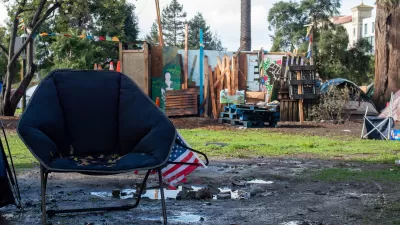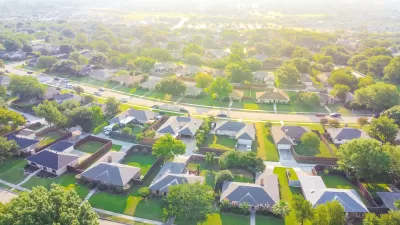Seeing "No Matter Where You're From" signs in liberal-leaning towns makes me both smile and cringe. Why? Because I know the tolerant message belies the real feelings many have towards neighbors, not from other countries, but "other" neighborhoods.
If you live anywhere with a substantial resistance to the current administration's attacks on immigrants, you may have seen the lawn/window signs–they say, in Spanish, English, and Arabic, “No matter where you are from, we’re glad you’re our neighbor.” (There’s also a variant in Hebrew, English, and Arabic.)
In an atmosphere of demagoguery and baseless hysteria about foreigners and immigrants, this kind of gesture is important (not sufficient, but important). I intend to get one.
But their popularity also makes me a little uncomfortable, and I imagine anyone else who pays attention to fair housing might feel similarly.
No Matter Where?
When I was on a work visit recently to Montclair, New Jersey, where Shelterforce's office is located, I saw these signs all over the place—on churches, lawns, and business windows. This is not surprising. Montclair is an epicenter for liberalism, well-known as a haven for (upper class) interracial couples, and the home of multiple former Obama administration officials, New York Times higher ups, foundation officials, and the like.
Seeing those signs everywhere made me smile. And it also made me cringe.
Because while the makers of the sign meant “what country you’re from,” what the sign says is “no matter where you're from,” and I know that for most of these folks, that actually isn’t true. They'll swear it is, but their actions will show otherwise.
FULL STORY: Lawn Sign Liberalism

Alabama: Trump Terminates Settlements for Black Communities Harmed By Raw Sewage
Trump deemed the landmark civil rights agreement “illegal DEI and environmental justice policy.”

Planetizen Federal Action Tracker
A weekly monitor of how Trump’s orders and actions are impacting planners and planning in America.

The 120 Year Old Tiny Home Villages That Sheltered San Francisco’s Earthquake Refugees
More than a century ago, San Francisco mobilized to house thousands of residents displaced by the 1906 earthquake. Could their strategy offer a model for the present?

In Both Crashes and Crime, Public Transportation is Far Safer than Driving
Contrary to popular assumptions, public transportation has far lower crash and crime rates than automobile travel. For safer communities, improve and encourage transit travel.

Report: Zoning Reforms Should Complement Nashville’s Ambitious Transit Plan
Without reform, restrictive zoning codes will limit the impact of the city’s planned transit expansion and could exclude some of the residents who depend on transit the most.

Judge Orders Release of Frozen IRA, IIJA Funding
The decision is a victory for environmental groups who charged that freezing funds for critical infrastructure and disaster response programs caused “real and irreparable harm” to communities.
Urban Design for Planners 1: Software Tools
This six-course series explores essential urban design concepts using open source software and equips planners with the tools they need to participate fully in the urban design process.
Planning for Universal Design
Learn the tools for implementing Universal Design in planning regulations.
Clanton & Associates, Inc.
Jessamine County Fiscal Court
Institute for Housing and Urban Development Studies (IHS)
City of Grandview
Harvard GSD Executive Education
Toledo-Lucas County Plan Commissions
Salt Lake City
NYU Wagner Graduate School of Public Service





























